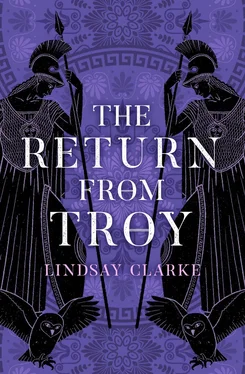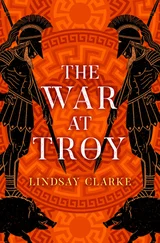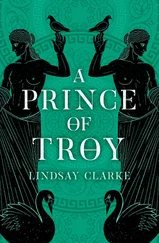‘You are not the first Argives to come to these parts,’ Hanno answered. ‘Your hero Jason was blown to Libya once. His ship became landlocked in Lake Tritonis a hundred miles from here. The goddess released him when he dedicated a silver tripod at her shrine in offering for his safe return. But some of his men chose to remain in Libya. I learned your language from their sons.’
The music writhed like a snake on the sultry air. Odysseus looked back where his crew were loudly applauding the dancer. One of them, a stout-bellied fellow called Grinus, leapt to his feet and began wiggling his hips beside her.
Hanno laced his fingers together at his chest. ‘They are happy, I think, to find themselves in a place where they are welcome – as they were not, I understand, in Phrygia and Thrace.’
‘They’ve told you about that?’
‘I had heard rumours of the war before you came. Now I know more, Lord Odysseus.’ He opened his hands in a mildly ironic gesture of obeisance. ‘I know, for instance, that your men love you fiercely. It has been hard to persuade them that you were merely sleeping from sheer exhaustion and should not be disturbed. They will be glad to find you awake when the dance is done. In the meantime, is there something more I can do for you?’
‘I am,’ Odysseus realized, ‘immensely hungry. If you have an ox to roast, I have room to devour it. Perhaps two even.’ He looked up, smiling, and was surprised to meet an expression of dismay on the other man’s face.
‘When you know Libya better,’ Hanno said, ‘you will see that none of the wandering tribes between Egypt and the Pillar of Heaven ever taste the flesh of cows. The beast is held sacred to the goddess.’ He rose to his gorgeously slippered feet. ‘In any case, it will be wiser if you do not eat too much too soon. Come, take more wine. It will help restore your strength. And you must try the local fruit. I think you will find it much to your taste.’
His companions were overjoyed to find their captain recovered from his long ordeal at the steering oar of The Fair Return. Already exhausted from the long battle with high seas during the southward voyage around Euboea and Sounion Head, Odysseus had tried again and again to double the steep eastern bluff of Cape Malea. Once through that rough passage, they could make the home run for Ithaca. But both wind and current has been against him and the waves were riding higher than his masthead. At each attempt to round the cape the ship was forced back; yet he had given up the effort only when Baias, equally exhausted at his side, cried out, ‘Poseidon is against us, lord! Better to run with the wind than be driven onto the cliff.’
With tears of rage and frustration mingling with the rain in his face, Odysseus had watched the savage headland fade into the flashing grey blur of the blizzard. Cythera became a ragged shadow drifting past his port bow and vanished. By the time the western coast of Crete smudged the horizon he was sleeping where he stood at the stern of the scudding ship.
Vaguely he remembered Eurylochus relieving him at the steering oar; then, so cold and stiff that he could scarcely bend his joints, he had been led to the foot of the mast and lashed there for safety while the ship hurtled on through the night.
The storm had finally cleared not long after a lurid dawn. The ship idled at last in a calmer swell. Eurylochus could make out two other vessels some distance away, but of the rest of the little fleet there was no sign. When land was sighted and the crew found the strength to row their battered vessel ashore, they had no idea where they were.
‘But I think we’ve discovered the Happy Isles,’ Eurylochus grinned at him now.
‘Certainly we’ve been lucky,’ said Baius, who had recovered more quickly than his captain, ‘and I thank the gods for it.’
‘And for the pleasures of this place,’ added Demonax, who was captain of the Swordfish.
Odysseus glanced at the half-naked dancer who sat glistening in her sweat with her thighs protruding from the fringed folds of her vermilion skirt. A number of brightly coloured leather bands were fastened about her legs.
He said, ‘The women, you mean?’
‘The women, yes,’ fat Grinus smiled, ‘the women are very good, but …’
‘And you can tell which are the best at making love,’ put in young Elpenor, ‘by the number of anklets they wear.’
‘Each of them is a tribute from a satisfied lover,’ Demonax explained. ‘So the more she has, the better!’
‘As long as you like your women well-used,’ Odysseus said. ‘However, my own thoughts incline more towards food right now, and this fruit of theirs …’
‘The lotus,’ Eurylochus supplied.
‘Well, whatever it’s called, I find it a touch sweet on my tongue. I gather that beef isn’t eaten hereabouts, but I was hoping that Procles might roast me a sucking pig.’
‘They don’t eat pork either, I’m afraid.’ Eurylochus was grinning as he spoke.
‘Yet you call this the Happy Isles! Is there nothing to eat but this cloying apology for a fruit?’
The men smiled at each other in amused conspiracy. ‘You mustn’t speak ill of the Lady Lotus, Captain,’ said Eurybates, whose black head was still bandaged from the wound he had taken at Ismarus. ‘We’ve all become her devotees.’
It had been a long time since Odysseus had seen his crew in so mellow and benevolent a mood. A little perplexed by it, aware that he was being teased, he said, ‘Then you all have even coarser palates than I thought.’
‘Not at all,’ Demonax tapped a finger at his pursed lips. ‘It’s an acquired taste.’
‘But it’s what happens when it’s made into wine,’ Grinus offered in explanation. ‘You’ve already tasted quite a lot of it, Captain, but perhaps you were too sleepy to remember. Here, let me pour you some more.’
An hour or two later, having eaten well on squid and barbecued goat’s flesh and a sticky dish made from the lotus fruit, Odysseus was sitting with his companions watching a huge sun sizzle like molten metal where it sank into the western sea. To the north a pale moon lay on its back with a single star hung in attendance. The Fair Return, the Nereid and the Swordfish lay side by side on the strand, all in need of repair, their holds only lightly guarded by a dozy watch of sailors. Egrets flashed their white wings in the evening sky. Not far away a string of camels recently arrived from a desert journey coughed and snorted as they lapped at a spring, while a solemn-eyed boy wearing goatskins soothed them with his pipes. In the distance, where the olive groves gave way to a rocky scrubland of juniper and tamarisk, they could hear a jackal yapping to the moon.
Not since they had been at home on Ithaca had the men known such a blessed time of peace. Strangely, however, none of them were thinking of home, not even Odysseus who had thought of almost nothing else in the last days of the war. The lotus had quietly worked its spell on him. Time had collapsed into a passive sequence of moments on which the past had no pressing claims, and where the future, with its prospects of anxiety and desire, was a matter of no enduring interest. And the war itself seemed to have dissolved into a wry anthology of stories that were, by this serene Libyan moonlight, curiously painless and often downright funny.
When Glaucus, the captain of the Nereid , dryly remarked that the yapping of the jackal put him in mind of that scurrilous dog Thersites, his words occasioned more hilarity than they merited. They led on to a happy remembrance of the way Odysseus had silenced Thersites’ foul-mouthed rant against him. Then they found they could laugh at the ridiculous quarrel between the insufferable Achilles and that vacillating bullfrog Agamemnon, and they were all helpless with mirth after fat Grinus reminded them of the truly awful stink of Philoctetes’ wound.
Читать дальше












